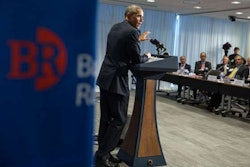
“Collaboration among fleets, manufacturers, and industry stakeholders is critical to driving the development and adoption of new technologies that improve fuel economy and reduce emissions,” said Scott Perry, Vice President, Supply Management & Global Fuel Products, Ryder and Chairman of the Board of NACFE. “Because Ryder operates one of the largest commercial fleets in North America, we often act as a proving ground for new technologies and are proud to lend our expertise by providing valuable insights about how they work in a broad base of real world applications. We have also benefitted from our involvement in Trucking Efficiency, which has led us to change our engine parameters to significantly reduce fuel consumption in our customers’ fleets.”
The tech guide at TruckingEfficiency.org provides access to unbiased, third-party information on over 70 technologies, so that fleet owners and operators can identify which ones might be appropriate for their fleet. This guide centralizes all existing data on available technologies and opportunities for the North American tractor-trailer sector, as well as the wealth of data collected in a series of Confidence Reports. NACFE and CWR’s initiative also provides a workshop series that brings together industry leaders and technology experts to facilitate shared learning on available technologies and provide open debate on the benefits and challenges of adopting them.









